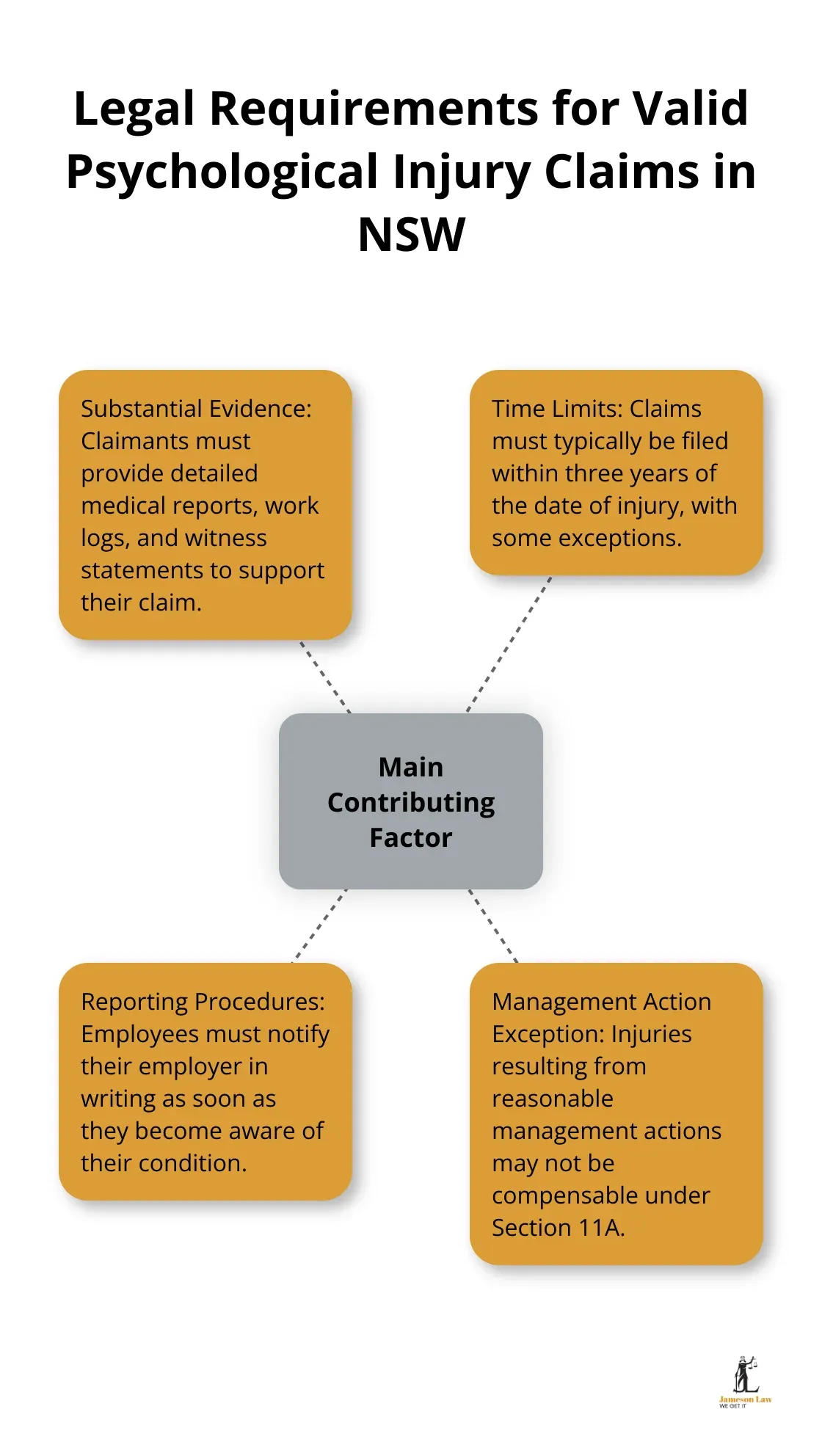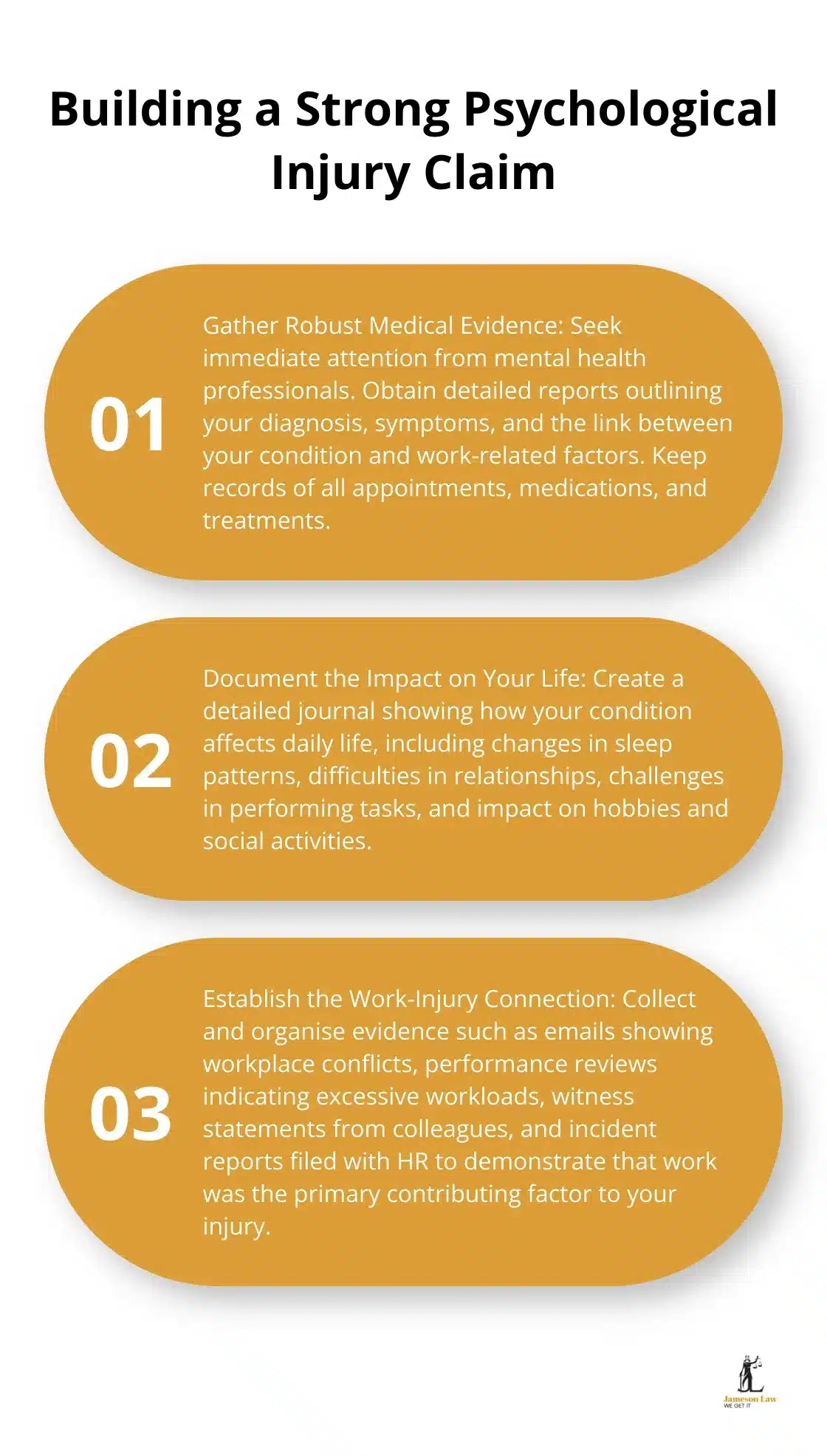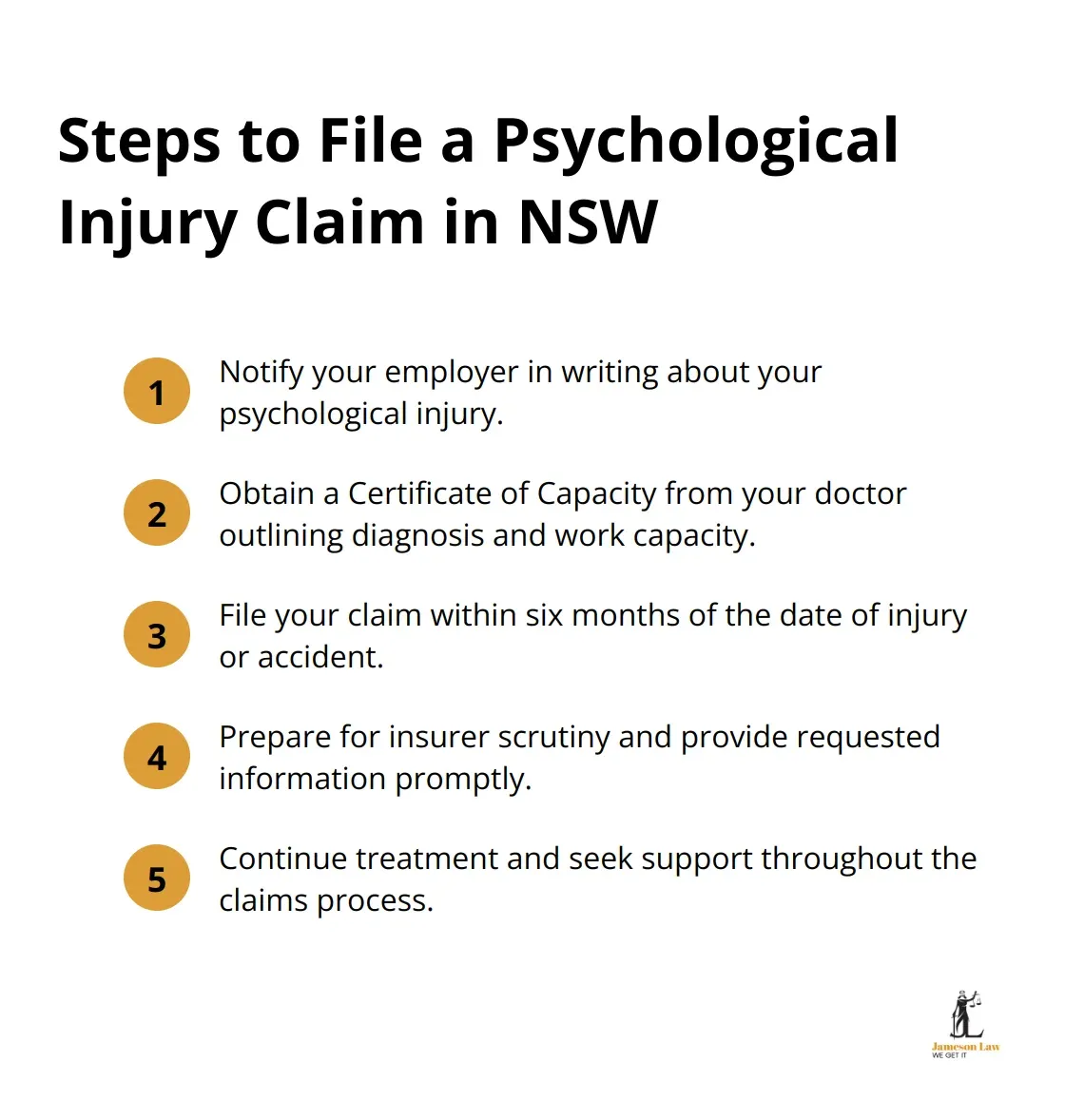Psychological injury claims can be complex and challenging to navigate. At Jameson Law, we’ve seen firsthand how these injuries can impact lives and livelihoods.
Understanding the key elements of successful psychological injury claims is vital for those seeking compensation. This guide will walk you through the process, from defining psychological injuries to proving your case and navigating the claims system.
What Are Psychological Injury Claims?
Legal Definition in Australia
Psychological injury claims in Australian law represent legal actions taken when a person suffers mental harm due to another party’s negligence. These claims are especially common in the workplace and form a critical part of NSW workers’ compensation law.
Common Types of Psychological Injuries
Post-traumatic stress disorder (PTSD), depression, and anxiety are frequent psychological injuries in workplace claims. These conditions often result from workplace bullying, excessive workloads, or traumatic events. For instance, a nurse who develops PTSD after witnessing a violent incident at work may qualify for a psychological injury claim.
Legal Requirements for Valid Claims
The Workers Compensation Act 1987 (NSW) stipulates that for a psychological injury claim to be valid, employment must be the main contributing factor to the condition. Section 11A of the Act states that if the psychological injury is a result of reasonable management actions, such as performance management or disciplinary action, it may not be compensable.

Evidence Requirements
Psychological injuries, unlike physical ones, are not immediately visible. This invisibility complicates the claims process. Claimants must provide substantial evidence, including:
![]() Detailed medical reports from mental health professionals
Detailed medical reports from mental health professionals
![]() Work logs
Work logs
![]() Witness statements from colleagues
Witness statements from colleagues
An office worker claiming compensation for work-related anxiety, for example, would need to present emails documenting workplace conflicts, along with a psychiatrist’s evaluation linking their condition to work stressors.
Time Limits and Reporting Procedures
In NSW, you must file most psychological injury claims within three years of the date of injury (subject to exceptions). It’s essential to notify your employer in writing as soon as you become aware of your condition (they have five days to inform their insurer).
The complexity of psychological injury claims underscores the importance of expert legal guidance. A skilled solicitor can help navigate the intricate process of gathering evidence, meeting deadlines, and presenting a compelling case.
How to Build a Strong Psychological Injury Claim
Gather Robust Medical Evidence
The foundation of any successful psychological injury claim is strong medical evidence. Seek immediate medical attention from a mental health professional, preferably a psychiatrist or psychologist with experience in work-related psychological injuries. Their detailed reports should clearly outline your diagnosis, symptoms, and the link between your condition and work-related factors.
Regular therapy sessions and consistent medical treatment not only aid your recovery but also create a paper trail that strengthens your claim. Keep a record of all appointments, medications, and treatments related to your psychological injury.
Document the Impact on Your Life
Psychological injuries often have far-reaching effects beyond the workplace. Create a detailed journal documenting how your condition affects your daily life, including:
![]() Changes in sleep patterns
Changes in sleep patterns
![]() Difficulties in personal relationships
Difficulties in personal relationships
![]() Challenges in performing everyday tasks
Challenges in performing everyday tasks
![]() Impact on hobbies and social activities
Impact on hobbies and social activities
Establish the Work-Injury Connection
To succeed in your claim, you must demonstrate that your work was the primary contributing factor to your psychological injury. Collect and organise evidence such as:
![]() Emails or messages showing workplace conflicts or unreasonable demands
Emails or messages showing workplace conflicts or unreasonable demands
![]() Performance reviews or work schedules indicating excessive workloads
Performance reviews or work schedules indicating excessive workloads
![]() Witness statements from colleagues corroborating your experiences
Witness statements from colleagues corroborating your experiences
![]() Incident reports or complaints filed with HR
Incident reports or complaints filed with HR
The burden of proof in psychological injury claims is higher than in physical injury cases. Your evidence must clearly show that work-related factors were the main cause of your condition, not personal life stressors.
Seek Expert Legal Guidance
The complexity of psychological injury claims underscores the importance of expert legal guidance. At Jameson Law, we guide our clients through this complex process, ensuring no important detail is overlooked in building a strong case for compensation.

How to File a Psychological Injury Claim in NSW
Filing a psychological injury claim in NSW requires careful planning and execution. The process can be complex, but understanding the steps and requirements will improve your chances of success.
Notify Your Employer
Start by informing your employer in writing as soon as you become aware of your psychological injury. This notification triggers a five-day window for your employer to inform their insurer. Be specific about the work-related factors that contribute to your condition.

Obtain Medical Documentation
Next, obtain a Certificate of Capacity from your doctor. This document outlines your diagnosis, work capacity, and recommended treatment. The NSW State Insurance Regulatory Authority (SIRA) provides standardised forms for this purpose.
Meet Statutory Deadlines
Time is critical in psychological injury claims. In NSW, you have six months from the date of the accident or injury to make a workers’ compensation claim. However, it’s best practice to file your claim as soon as possible.
Navigate Insurer and Employer Interactions
Once you lodge your claim, the insurer has time to make an initial decision. During this period, they may request additional information or arrange an independent medical examination.
Insurers often scrutinise psychological injury claims more closely than physical injury claims. They may argue that your condition results from reasonable management action or personal life stressors rather than work-related factors. To counter these challenges, maintain detailed records and seek legal advice from specialist solicitors.
Prioritise Your Mental Health
The claims process can be emotionally taxing. Put your mental health first throughout by continuing your treatment and seeking support from loved ones or professional counsellors. Your wellbeing should always take precedence (regardless of the claim’s outcome).
Final Thoughts
Successful psychological injury claims require a comprehensive approach and meticulous attention to detail. We at Jameson Law understand the complexities involved in these cases and offer expert guidance to protect your rights. Our team specialises in psychological injury claims and provides tailored legal support throughout the entire process.
Our extensive experience allows us to offer strategic advice, gather compelling evidence, and present your case effectively. We recognise the challenges you face and commit to achieving the best possible outcome for your claim. Our No Win No Fee policy for personal injury matters enables you to pursue your claim with confidence.
If you are considering filing a psychological injury claim or need assistance with an existing case, contact Jameson Law today to discuss your options. Your wellbeing and rights deserve expert advocacy — and we’re here to help.













